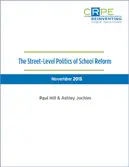This paper is a primer on the politics of school reform. It is written for school superintendents and civic leaders seeking to improve K–12 education in their cities, to help them anticipate the inevitable challenges and be prepared to manage the politics. We examine the political challenges that have emerged in key cities pursuing the portfolio strategy, and how city leaders overcame (or were overcome by) those challenges. These cities, more than others, have changed how schools are funded, which providers are eligible to receive funds, and the distribution of power between unions, the central office, schools, and other stakeholders. Our analysis refutes a common belief among reformers: that the key to success is to circumvent politics. We conclude with lessons to help reformers leverage local politics to their advantage.





